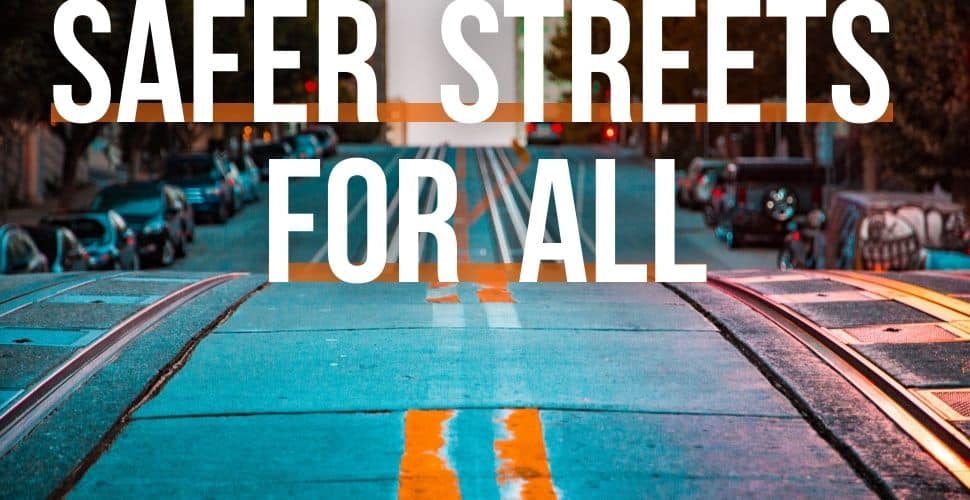By Jamison Liang, Freedom United and Leigh LaChapelle, Cast
The Safer Streets for All Act was signed into law on July 1, 2022 and will come into effect in January 2023.
Freedom United and our partner Cast were proud to back the Safer Streets for All Act (SB 357), an essential bill just signed into law in California that will stop survivors of trafficking and sex workers from facing a criminal record simply for walking on the street. It does so by repealing Section 653.22 of California’s penal code — a harmful, archaic law that criminalizes loitering for the intent to engage in prostitution.
It’s an overly vague code that criminalizes intent rather than actual action, meaning people across California are subjectively targeted and arrested based on what they look like, including the clothing they are wearing, how they are speaking with other pedestrians, where or how they stand, or for their gender or color of their skin.
The injustices of the penal code are clear.
Over 9,000 people signed our joint petition in support of the Safer Streets for All Act. Still, we have observed some misunderstandings about what this law does — and what it does not do.
Media coverage has at times framed the law as a choice between helping trafficking victims or supporting sex workers. To be clear, this is a false choice and a framing that helps no one. A core argument of detractors of SB357 suggests that without the anti-loitering law in place, police will be powerless to investigate trafficking or help victims. The reasoning? Police should be able to arrest a trafficking victim, in theory taking them away from a trafficker by taking them into police custody.
Yet what about people who are arrested under the loitering statute who are not trafficking victims? Or trafficking victims who are unable or unwilling to leave their situations just yet and end up with a criminal record as a result. What does amassing a criminal record mean for trafficking survivors and their ability to access safe housing, meaningful employment, and raise their children? If the police are not making arrests under the loitering law, how can trafficking victims access help?
To delve into these issues, Jamison Liang from Freedom United sat down with Leigh LaChapelle from Cast to explain why the Safer Streets for All Act will help in trafficking prevention and demonstrate that a non-carceral approach is both possible and effective in addressing trafficking.
J: Thanks for making the time to chat. To start, can you introduce yourself and what you work on at Cast?
L: Thank you for having me. I’m Leigh LaChapelle (they/them) and I’m currently working as the Associate Director of Survivor Advocacy at the Coalition to Abolish Slavery and Trafficking (Cast). In my role I ensure there’s a direct bridge between our holistic direct services, our survivor leadership programming, and our local, state, and federal policy work. I bring to the role lived experience and years of working on the front lines with survivors escaping their trafficking situations. I’m so excited that I have a chance to speak with you today about SB 357 and why Cast was a supporter.
J: California’s Governor Gavin Newsom has now signed the Safer Streets for All Act, which will repeal the penal code that criminalizes loitering for intent to engage in prostitution. What was the thinking behind passing this penal code in 1995 and what have been the impacts over the past 27 years?
L: Cast is thrilled that the Safer Streets for All Act has been signed into law. We want to thank the Governor as well as the survivors and grassroots organizers who moved this bill forward.
Many people are unaware that the history of loitering laws is just as discriminatory in nature as their subsequent enforcement. Loitering laws were never enacted to help human trafficking survivors, or survivors of any type of violence, but were instead enacted to criminalize communities of color. In 1850 the California legislature passed a law that included a provision that allowed for the arrest, sale, and forced labor of Indigenous individuals “who shall be found loitering and strolling about”. Similarly, after the Reconstruction era, loitering laws were used to arrest and sentence Black men to forced labor.
California codified the crime of loitering through Penal Code Section 647(e) in 1872. In 1983 the U.S. Supreme Court invalidated 647(e) for being “unconstitutionally vague” in a case brought by Edward Lawson, a Black man who had been repeatedly arrested under this code for walking in white neighborhoods in Southern California. Despite this, the California legislature enacted penal code 653.22 which criminalizes loitering yet again – but this time “with the intent to commit prostitution”. Human trafficking wasn’t the cause behind 653.22 when it was passed in 1995, its intention was part of a larger “tough on crime” strategy to control and criminalize the movements of people who engage in the sale of drugs or the sex trade.
What we know from the data we have is that this code has not been used to arrest traffickers or stop trafficking. There’s a gender disparity in the who has been arrested – and its mostly cisgender and transgender women. The arrest of survivors and sex workers does not prevent trafficking, but instead creates insurmountable barriers to safe housing, employment, and immigration.
J: So the Safer Streets for All Act, or SB357, aims to correct those injustices. You’ve previously written how Black and brown communities, especially cisgender and trans women of color, are disproportionally arrested under the loitering statute. Some have argued that this is because they are disproportionally victims of trafficking. What’s actually going on in California and how would the Safer Streets for All Act help communities of color?
L: An issue to note here is that there is a lack of comprehensive available data on human trafficking throughout the U.S. Cast is fighting for evidence-based research and prevalence studies in California so that we can all learn more about who is impacted by human trafficking. Whether Black and Brown communities are disproportionally targeted by law enforcement or disproportionally trafficked – arrest is not the answer. Human trafficking is the criminal expression of political and economic disenfranchisement. What this means is that human trafficking reflects and amplifies existing kinds of oppression and exploitation. These root causes are not addressed in any way by arrest, which only creates and increases vulnerability.
Trafficking survivors, folks working across the spectrum of agency in the sex trade, BIPOC communities, and transgender communities are not populations that are mutually exclusive. Criminalization negatively impacts all of these populations and the individuals who exist at the intersection of all of these identities that are often overlooked in these discussions.
J: Central to the debate surrounding SB357 is the role of the police in identifying trafficking victims. The Safer Streets for All Act has now been signed into law and will come into effect in January 2023. As police will no longer make loitering arrests, what avenues are there for victims to find help?
You’ve written that Cast has proven success in non-carceral programs as “Our own emergency response program has assisted 265 survivors with escape since 2020 with only 1% of those calls being facilitated by law enforcement.” Can you explain how that works and the advantages of this model?
L: We have a 24/7 Emergency Response team that responds to survivors escaping their trafficking situations in Los Angeles County without relying on law enforcement facilitation. We do not require that survivors make a police report to use these services and we focus on core needs – shelter, transportation, financial assistance, and safety planning. We do not need to arrest survivors to conduct outreach but instead we aim to be thoughtful and strategic with how we engage.
Within our Emergency Response Program we also have our Survivor Advocate Program in which a skilled survivor of human trafficking is present as a professional advocate within the healthcare systems of Los Angeles to train staff and to connect with potential survivors who may need assistance. When we recognized that survivors of trafficking were often receiving healthcare services while being trafficked but not being identified, we partnered with local providers to create a survivor-led solution. Outreach and intervention is necessary, but it should be trauma-informed and led by survivors and service providers whenever possible.
And most importantly, our services and our outreach shouldn’t be rooted in the coercion and force of arrest. The advantage of this model is that it is trauma-informed, consent-based, and reduces the criminalization of survivors compared to other models of intervention. The majority of our emergency response cases start because a survivor reached out directly to our hotline to request support. This happens because our community trusts that they can access our services without being criminalized.
There is still a plethora of penal codes law enforcement can use to intervene in human trafficking. They simply cannot arrest someone for their often-biased perception of intent instead of an actual crime.
J: I’ve sensed that there is shared agreement that there need to be more resources and social support for trafficking survivors, including employment, safe housing, and immigration relief. These aren’t covered by SB357, but this also isn’t the place to do it within the context of amending the criminal code. So what should that comprehensive support system look like?
L: That’s correct! You cannot directly add services or support programming while amending the criminal code. No one is positioning SB 357 as the total solution. But what we know is that we cannot cause harm to end harm. Jail is not outreach and it certainly is not services. And using arrest as a gateway to receiving services is harmful and creates distrust in our communities.
The coalition behind the bill, Decrim Sex Work CA, is currently working on tandem efforts for funding to provide housing to sex workers in California. In June of 2021, the California Legislature passed Cast’s $30 million request to fund human trafficking victim service providers over three years. This $30 million will provide emergency funding for survivors of human trafficking amidst the COVID-19 pandemic and its aftermath to ensure survivors in every part of the state have a place to go for safety, support, and services.
This additional $30M comes at a time when numbers of urgent human trafficking cases are at an all-time high. The existing $10 million per year of on-going state funding to human trafficking victim service providers is not enough to handle the escalating needs of survivors and their families. Because of this advocacy, the total state budget funding for these programs over the next three years will equal $60 million. This increase will provide more resources to adequately address the needs of survivors in California where human trafficking cases are the highest among any state. We work tirelessly to ensure we are advocating for legislation on a state and federal level that will increase available services and support survivors.
Simultaneous strategic advocacy is required to fight human trafficking. Yes, we must increase services and available funding. But we also must take an honest look at systems that are causing harm to survivors and work to correct them.
J: Broadly speaking, I see the Safer Streets for All Act as part of the movement to stop criminalizing survivors of trafficking, especially in the name of ‘rescue.” I liked your statement that “Utilizing arrest through the loitering statute to identify survivors or offer services is not an ethical means of outreach.” Can you speak more to this and what you’ve seen at CAST?
L: Cast is a learning organization; we listen to and learn from the survivors who come into our services. In a survey conducted by Cast’s National Survivor Network, over 90% of survivor respondents reported being arrested and over half of all respondents believe their arrest is directly related to their trafficking. 40% of the 130 respondents had been arrested 9 times or more – and only 7 of those survivors had never been arrested. Even after leaving their trafficking situation, a criminal record can still permeate every other aspect of their life, including disqualification from public housing, welfare benefits, job training, employment and immigration relief.
The denial of these basic necessities for survival creates vulnerabilities that can result in re-trafficking. There is a widespread lack of awareness and understanding of forced criminality, which occurs when survivors are forced by their traffickers to commit crimes or forced to engage in a criminalized industry. We must increase education on forced criminality and its impact on survivors – especially survivors of color.
We cannot continue to address human trafficking reactively. We cannot continue to only show up for survivors after they have been harmed. Human trafficking will never be eradicated until we re-direct our resources to strengthen our communities. Protecting children starts with proactively protecting parents and families. Free access to housing, healthcare, universal basic income, and safe immigration are all necessary components to anti-trafficking prevention. It is critical that we all shift towards a human rights framework and a public health approach in our anti-trafficking efforts that is trauma-informed and evidence-based, and most importantly survivor-centered.
J: As the bill gives those who were arrested under the loitering statute the power to clear their names, how would they do this in practice?
L: Legal services are one of the many programs that are offered under Cast’s holistic model. Our attorneys spend countless hours working to clear the criminal records of survivors who were criminalized or forced to commit crimes by their traffickers. This bill reduces the burden on survivors in clearing their records of this charge. It creates the presumption that their petition should be approved and doesn’t require a hearing. This process is stream-lined and will allow for survivors to navigate the criminal legal system in a more trauma-informed way.
J: Is there anything else you’d like to add?
L: Human trafficking is a heinous crime that affects individuals of all backgrounds and identities throughout our state. This requires action on socio-economic inequities, homelessness, racial disparities, gender violence, homophobia, ableism, immigration issues, political instability, environmental crises, & more. Survivors of human trafficking not only deserve access to safe housing, healthcare, employment, and immigration, but to live in a world in which we work together to prevent human trafficking by investing in the continued care of our communities.







Can’t find the link to sign this petition. Hope others can show their support in increasing the number of views expressed to stop this unjust laws now.